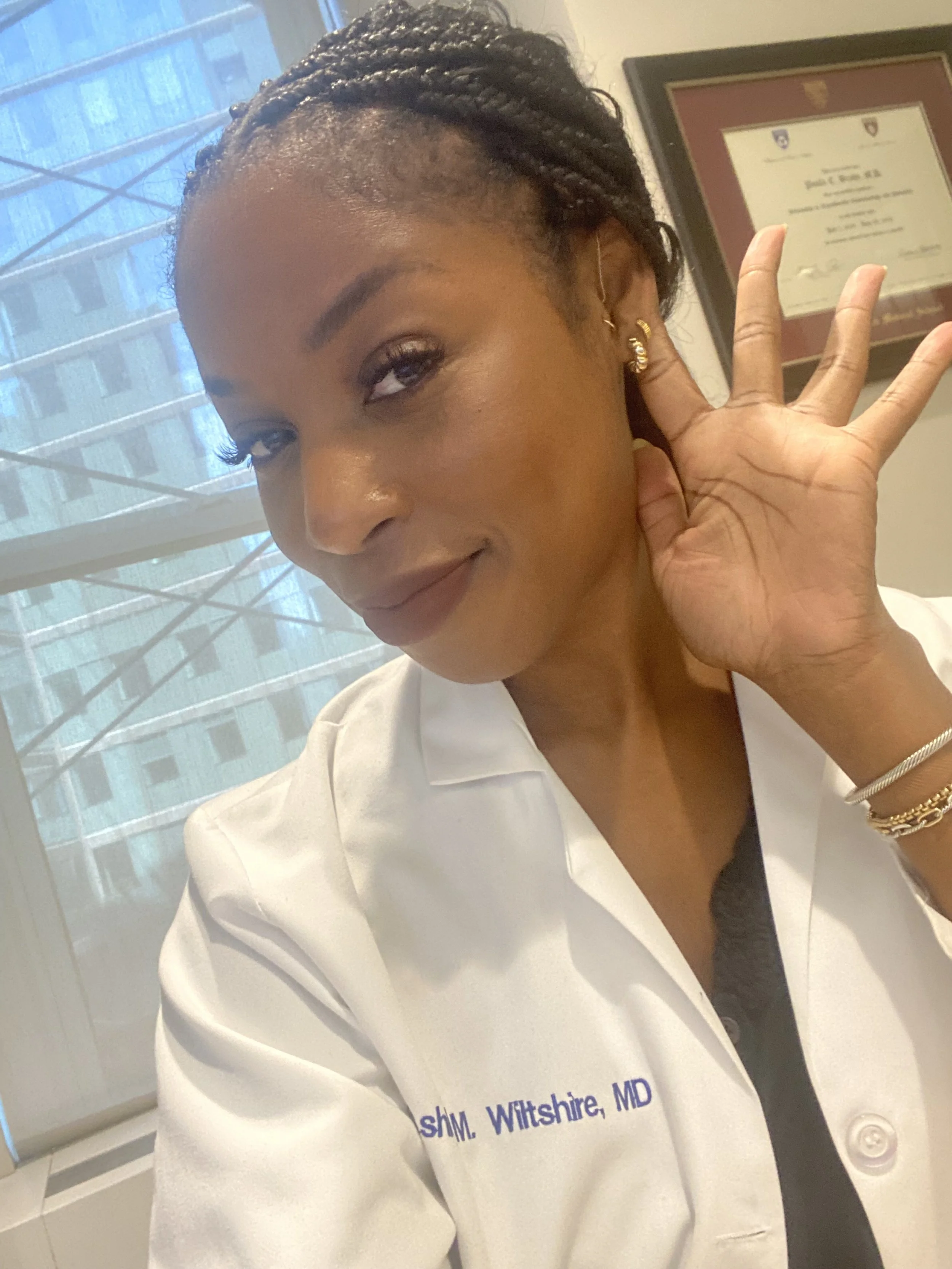Meet Dr. Ashley Wiltshire.
Ashley is posing in front of a river and bundled up in a cozy fall outfit. She is wearing jeans, a green top and a brown coat over it. Layered on top is a beanie and a grey scarf, as well as a black hand bag and white sneakers.
Hi there! I’m Dr. Ashley Wiltshire—an obstetrician-gynecologist and fertility specialist, and I also happen to be hard of hearing (HoH). In this post, I want to share a bit of my personal story—what it’s been like to navigate life with hearing loss, how it’s shaped my understanding of invisible disabilities, and the surprising ways it’s influenced my path in reproductive medicine.
Hearing Loss: A Personal Beginning
For most of my life, hearing loss felt like something that belonged to my dad—a chapter in his story, not mine.
My dad started losing his hearing in his mid-twenties, after a brutal case of chickenpox. By the time I came along, hearing aids were already part of his daily life. I grew up fluent in a language made just for us: a mix of lip reading, writing, and bits of sign. With no family history of hearing loss, he saw countless specialists over the years, but no one could provide a clear answer about why it happened. Eventually, he swapped out his hearing aids for cochlear implants—and just like that, another chapter of his hearing journey began.
What I didn’t realize then was that I was quietly writing my own version of that story.
In 2020, I moved to New York City in the middle of the pandemic to continue my subspecialty training in reproductive endocrinology and infertility. Like everyone else, I was trying to keep my head above water. But something was shifting. The tinnitus I’d had for years—the soft ringing I used to brush off—was suddenly impossible to ignore. It got louder, more relentless. And with everyone masked up, I found myself struggling to follow conversations in ways I never had before.
A visit to an audiologist confirmed the news: I had hearing loss. I was fitted with hearing aids that doubled as a white noise machine to help with the tinnitus. What followed was one of the most emotionally challenging periods of my life. However, through therapy, I slowly began to process it all and find peace with my “new normal.”
And with time, I realized: this wasn’t the end of anything. It was the beginning of something new.
Living with an Invisible Disability
Navigating life with an invisible disability is a journey of its own, especially when you’ve spent most of your life appearing "able-bodied" in the eyes of society. Since my diagnosis, I’ve had to advocate for myself in ways I never anticipated. Asking for accommodations, explaining my needs—it all takes a level of vulnerability that isn’t always easy to tap into.
But here’s what I’ve learned: our presence matters. Representation matters. The workplace and medical spaces are still built around ableist norms, and it’s up to all of us—those living with disabilities and our allies—to challenge that structure. Hearing loss shouldn’t be a barrier to anyone’s passion, goals, or dreams. We all deserve a seat at the table.
Fertility & Hearing Loss: An Unexpected Intersection
About 48 million Americans live with some degree of hearing loss, and roughly 15% of men and women of reproductive age experience infertility. These might seem like completely unrelated challenges—but as a fertility specialist with hearing loss, I see them intersect more often than you'd think.
Being able to offer a deeper level of empathy and communication to my HoH and Deaf patients is one of the things I treasure most about my work. Hearing loss can be confusing—especially when there’s no clear explanation. But the truth is, genetics often plays a bigger role than most people realize. In fact, genetic factors are believed to account for up to 80% of childhood hearing loss, and it’s also a significant contributor to many adult-onset cases.
Through options like In Vitro Fertilization (IVF) and preimplantation genetic testing, some patients may choose to know the chances of passing on certain hearing-related genes.
I’m here to offer knowledge and support so they can make decisions that feel aligned, empowered, and true to who they are.
Community, Connection & Pride
If you’re new to the hearing loss community, the best piece of advice I can offer is this: you’re not alone.
Even though hearing loss is common, it can feel incredibly isolating—especially when it’s paired with tinnitus. But we live in a time where social media creates powerful opportunities for connection. There are amazing pages, support groups, and individuals who share their stories and offer advocacy, education, and solidarity.
For me, a turning point was discovering pride. I proudly wear my hearing aids. I proudly show up as a physician who is hard of hearing. And while my hearing loss doesn’t define me, it is a huge part of who I am. My hope is that by sharing my story, someone out there feels a little more seen, a little more reassured, and a little more heard.
Thank you so much for reading and sharing space with me here. 💛 Be sure to follow FTDG and me on social media for more insights and conversations. And to my NYC folks—if you’re exploring your fertility journey and want to chat, come visit me at Columbia University Fertility Center. I’d love to connect!
Until next time,
Dr. Ashley Wiltshire
HoH Fertility Specialist | Advocate | D/Deaf Girl Blogger
https://doctors.columbia.edu/us/ny/new-york/ashley-m-wiltshire-md-5-columbus-cir






